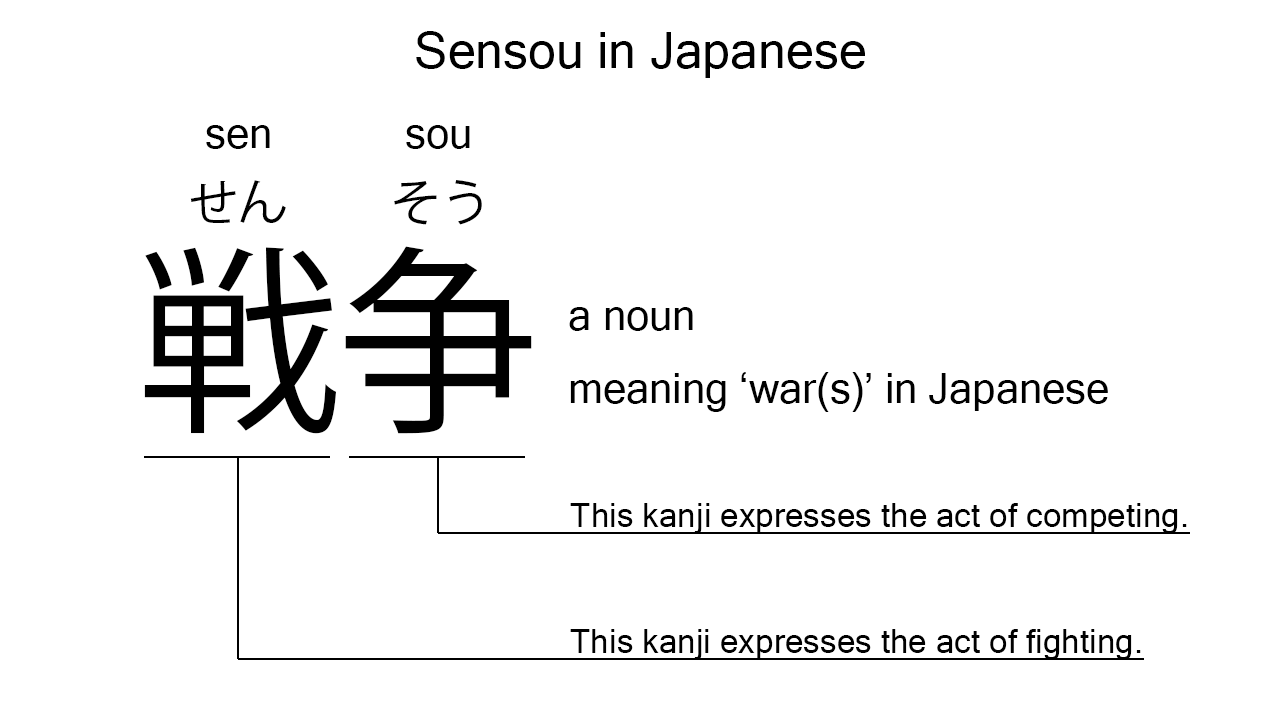What does “sensou” mean in Japanese?
Native speakers say “sensou” to mean ‘war’ in Japanese. Perhaps, some Japanese learners know this word as it is sometimes used in Japanese movies, novels, manga, anime, and the like. In this blog post, however, I will explain this word in detail based on its kanji expression. And also, I will explain how to use it through example sentences. My explanations would help Japanese learners understand “sensou” more clearly. Then, let’s get started!
Contents
Definition and meaning of “sensou”
Let me start with the definition and meaning of “sensou”.
- sensou – 戦争 (せんそう) : a noun meaning ‘war’ in Japanese. This can also work as plural. Learn more about Japanese plural.
The definition and meaning are simple and clear. To understand this noun more clearly, however, let me explain its kanji characters in detail, one by one.
Sensou in kanji
The kanji expression of “sensou” consists of the following two kanji characters:
- 戦 : a kanji character used to express the act of fighting. This can also be found in other words like “tatakau” and “senshi“.
- 争 : a kanji character used to express the act of competing.
These two kanji characters tell us that “sensou” literally means ‘fighting and competing’ in Japanese. This literal interpretation is not completely in line with the actual meaning, but still understandable, I think. In wars, people often need to fight and compete each other for wins.

When we meet new kanji expressions, we should check their kanji characters in detail to understand their meanings clearly and deeply. In many cases, kanji characters tell us a lot about the meanings of the expressions they form. Actually, here, we could get the better understanding of “sensou” through the detailed kanji check above.
So far, I’ve explained the definition and meaning of “sensou” together with its kanji characters. Then, let me explain how to use it through the example sentences below.
Example #1: how to say “war” in Japanese
otoko tachi wa sensou ni it ta – 男達は戦争に行った (おとこたちはせんそうにいった)
The men went to war.
Below are the new words used in the example sentence.
- otoko – 男 (おとこ) : a noun meaning ‘man’ or ‘male’ in Japanese. This can also work as plural.
- tachi – 達 (たち) : a suffix used after a noun or pronoun to make its plural form. In the example, this is used after “otoko” to make its plural form, “otoko tachi”, which means ‘men’ in Japanese.
- wa – は : a binding particle working as a case marker or topic marker. In the example, this works after “otoko tachi” to make the subject in the sentence.
- ni – に : a case particle used to say where someone or something goes. In the example, this is used after “sensou” to say where the men went.
- it – 行っ (いっ) : one conjugation of the verb, “iku“, which means ‘to go’ in Japanese. In the example, it has been conjugated for the better connection with its following word.
- ta – た : an auxiliary verb used after a verb, adjective, or auxiliary verb to make its past tense form. Probably, this is well known as a part of Japanese ta form. In the example, this is used after “it” to make its past tense form, “it ta”, which means ‘went’ in Japanese.
This is a typical usage of “sensou”. In the example, it works as a part of the phrase, “sensou ni it ta”, which literally means ‘went to war’ in Japanese.
Example #2: another usage of “sensou”
kanojo no koibito wa sensou de korosa re ta – 彼女の恋人は戦争で殺された (かのじょのこいびとはせんそうでころされた)
Her boyfriend was killed in the war.
Below are the new words used in the example sentence.
- kanojo – 彼女 (かのじょ) : a pronoun meaning ‘she’ in Japanese.
- no – の : a case particle working after a noun or pronoun to make its possessive case. In the example, this works after “kanojo” to make its possessive case, “kanojo no”, which means ‘her’ in Japanese.
- koibito – 恋人 (こいびと) : a noun meaning ‘girlfriend’, ‘boyfriend’, or just ‘partne’ in Japanese.
- de – で : a case particle used to say where someone does something. In the example, this is used after “sensou” to say where the boyfriend was killed.
- korosa – 殺さ (ころさ) : one conjugation of the verb, “korosu“, which means ‘to kill’ in Japanese. In the example, it has been conjugated for the better connection with its following word.
- re – れ : one conjugation of the auxiliary verb, “reru”, which is used after a verb to make its passive form. In the example, this is used after “korosa” to mean ‘to be killed’ in Japanese.
This is another typical usage of “sensou”. When we want to refers to wars in Japanese, this noun is always a very good option.
Summary
In this blog post, I’ve explained the definition and meaning of “sensou” in detail based on its kanji expression. And also, I’ve explained how to use it through the example sentences. Let me summarize them as follows.
- sensou – 戦争 (せんそう) : a noun meaning ‘war’ in Japanese. This can also work as plural. These two kanji characters literally mean ‘fighting and competing’ in Japanese. This literal interpretation is not completely in line with the actual meaning, but still understandable, I think. In wars, people often need to fight and compete each other for wins.
Hope my explanations are understandable and helpful for Japanese learners.